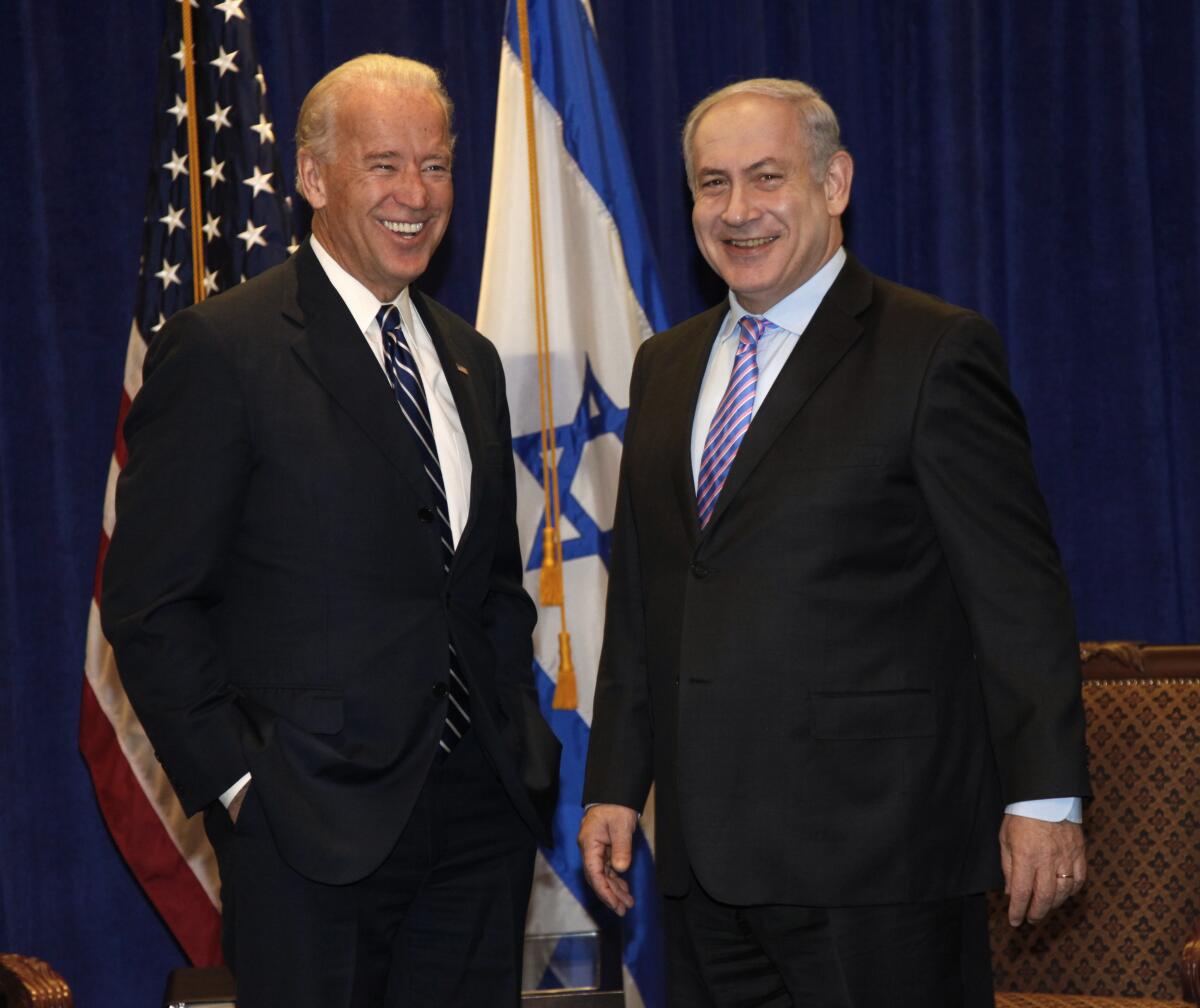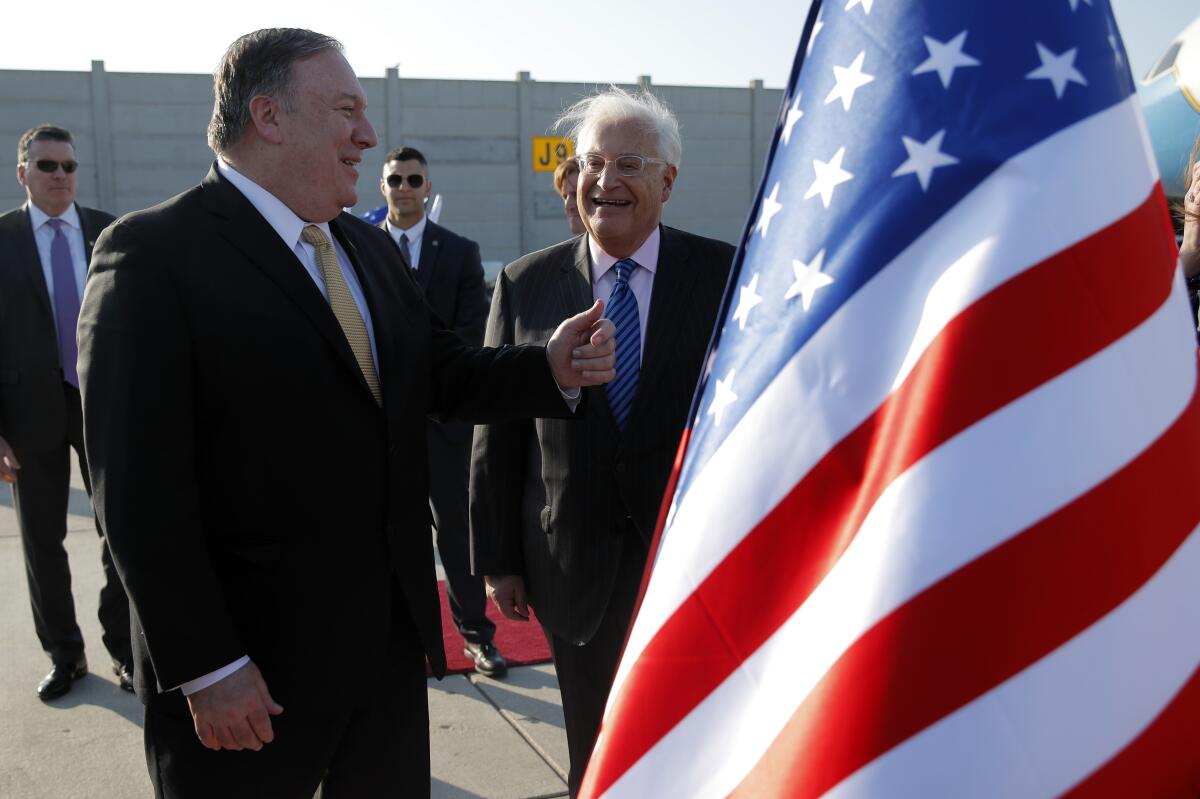What a Biden win means for Israel’s vehemently pro-Trump prime minister

- Share via
JERUSALEM — Sixteen days after the U.S. election, and 12 days after Joe Biden was declared the winner, Israeli Prime Minister Benjamin Netanyahu’s Twitter account still bore a banner showing him beaming alongside President Trump.
Few world leaders have aligned themselves quite so tightly with Trump as Netanyahu, Israel’s longest serving prime minister. But Netanyahu is known to admirers and detractors alike as a political survivor without peer. Accordingly, he has embarked on a new relationship with the U.S. president-elect — even while working assiduously to protect and advance the largesse showered on him by Trump.
That could prove difficult maneuvering even for Netanyahu, dubbed “the magician” for his storied ability to wriggle out of tough predicaments. Trump’s electoral loss comes at a particularly bruising domestic juncture for the prime minister.

Netanyahu is faring poorly in opinion polls and struggling to contain a new wave of COVID-19 and its attendant economic damage. He is on trial for felony corruption charges and is fending off challenges from angry political opponents and perhaps even angrier erstwhile allies. But the prime minister’s troubles and his political kinship with the outgoing president are unlikely to recast Israel’s essential relationship with Washington.
“The average Israeli knows that the country’s alliance with the United States is a necessary strategic security asset,” said Tzipi Livni, a former foreign minister who was once a member of the prime minister’s Likud Party, but later went over to the opposition. “Netanyahu knows that the Israeli public expects him to find a way to work with any American president.”
But even with a bedrock historical relationship as a starting point, Netanyahu may find his fierce pro-Trump partisanship to be a setback under a new U.S. administration: Biden may be less accommodating when it comes to sensitive matters such as the Palestinians, Jewish settlements and whether the U.S. returns to the Iran nuclear deal, analysts said.
“I think Netanyahu will have some difficulty bringing the relationship back to what it once was. He bet on the Republicans,” said Hebrew University political science professor Gideon Rahat. “It is pretty clear that the relationship will be more difficult for him.”
The prime minister’s bluster and designs on the region neatly — and often loudly — coincided with Trump’s. Netanyahu heartily congratulated the president the morning after his 2016 victory. But he has charted a far more cautious course this time, even taking into account the time lag in tabulating U.S. results due to heavier-than-usual use of mail-in and absentee balloting tied to the coronavirus outbreak.
When Biden was declared the winner on Nov. 7, Netanyahu waited a much-remarked-upon 12 hours to extend congratulations to him and his running mate, Sen. Kamala Harris — and even then, the prime minister carefully coupled that with a separate Twitter tribute to Trump.

The prime minister’s ambivalence pointed to a painstaking political calculation. Trump remains popular among Netanyahu’s hard-right base, and in the run-up to the U.S. balloting, many in the prime minister’s camp ignored the possibility of a Biden victory.
Shortly before the election, analyst Shimrit Meir wrote in the leading newspaper Yediot Aharonot that “official Israel is showing no signs of preparation for the day after Trump — not politically, not in terms of public communications, and no less importantly, not mentally.”
Although critics accuse Netanyahu of imperiling bipartisan U.S. congressional support for Israel with his thoroughgoing loyalty to Trump, the 71-year-old prime minister was quick to remind Biden, 77, of their acquaintance of decades’ standing.
“We’ve had a long & warm personal relationship for nearly 40 years,” Netanyahu tweeted on Nov. 8, addressing Biden. That drew a memorable riposte from Martin Indyk, a former U.S. ambassador to Israel, who slyly suggested that the former vice president, with his long Senate experience, was no naif about Netanyahu’s ability to dissemble.
“It’s true that @netanyahu has known @JoeBiden for nearly 40 years,” Indyk wrote on Twitter. “But it’s also true that @JoeBiden has known @netanyahu for nearly forty years.”
Some of the political favors bestowed on Netanyahu by Trump, a number of them transparently timed to boost the prime minister’s electoral fortunes, are likely to survive the change in U.S. leadership, while others are expected to be subject to reversal or steps meant to serve as a counterweight.
Trump withdrew from the landmark nuclear accord with Iran that was largely engineered by then-President Obama, moved the U.S. Embassy to disputed Jerusalem, slashed aid to the Palestinians and put forth a Mideast diplomatic blueprint that was heavily tilted toward Israeli interests.
“Netanyahu understands perfectly that Biden will return to the [Iran deal], and his task is to convince Biden not to return to the deal as it is,” said Dani Dayan, Israel’s former consul general in New York. “Netanyahu will try to achieve maximum differences” from the accord struck in 2015 between Iran and world powers.
Palestinian officials, in a gesture that suggested hopes for revived U.S. diplomatic support for eventual Palestinian statehood, this week announced restored security cooperation with Israeli authorities.
Even if Netanyahu, no stranger to realpolitik, is fully prepared to pivot to a Biden presidency, he and his allies have left little doubt they will seek to impose additional “facts on the ground” — a term often used to describe settlement building and associated activities — during Trump’s remaining two months in office.

Secretary of State Michael R. Pompeo traveled Thursday to a West Bank Jewish settlement, the first time a top U.S. diplomat had done so — pointedly underscoring the Trump administration’s acceptance of the settlements, despite the view of most of the international community and the Palestinians that they violate international law and are a serious impediment to Palestinian statehood aspirations.
At the same time, Netanyahu’s government is pushing ahead with a planned expansion of a settlement called Givat Hamatos outside Jerusalem. Critics say it would harm prospects for a viable Palestinian state by further impeding travel between traditionally Palestinian East Jerusalem and Bethlehem, the closest major West Bank town.
“These days constitute an irreplaceable opportunity to secure our hold on the Land of Israel,” Miki Zohar, the chair of Netanyahu’s coalition in the Knesset, or parliament, wrote on Twitter, using terminology meant to designate the occupied West Bank as part of Israel proper. “I am sure that our friend President Trump and Prime Minister Netanyahu will be able to take advantage of them to the best of their ability.”
The Trump-ordered U.S. Embassy move to Jerusalem is expected to stand — although there is an expectation that the Biden administration will reopen a U.S. consulate that primarily serves Palestinians in Jerusalem.
“There are some physical manifestations of this [Trump] era that can’t be reversed,” acknowledged Jeremy Ben-Ami, president of the liberal U.S. Jewish advocacy group J Street. But as far as a U.S.-condoned free rein for Netanyahu’s agenda goes, he said, “the party’s over.”
Livni, the former foreign minister, said Trump’s combative personal and political style, as adopted and adapted by the prime minister — attacking law enforcement and the judiciary, denigrating the independent news media — could continue to color Israeli politics in the longer term.
“Netanyahu took what Trump was doing in the United States,” she said, “and translated it into Hebrew.”
Special correspondent Tarnopolsky reported from Jerusalem and Times staff writer King from Washington.
More to Read
Sign up for Essential California
The most important California stories and recommendations in your inbox every morning.
You may occasionally receive promotional content from the Los Angeles Times.










